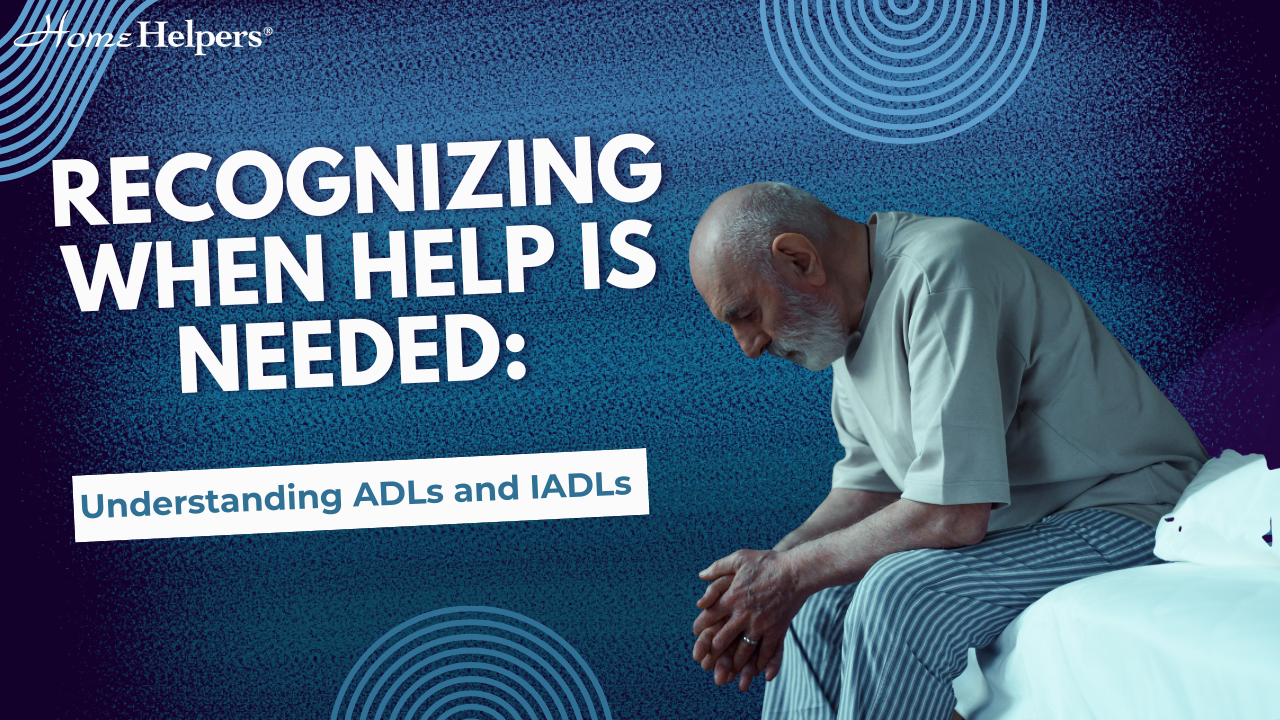Recognizing When Help Is Needed: Understanding ADLs and IADLs in the Northern Shenandoah Valley

Author: Home Helpers Home Care
Maintaining a clean home, preparing meals, and managing personal hygiene are tasks we often take for granted—until they become difficult. For aging adults in Winchester, Front Royal, Purcellville, and across the Northern Shenandoah Valley, these everyday responsibilities may gradually become challenging due to health changes or the natural aging process.
If you’ve noticed your parent or elderly loved one struggling with these routine tasks, it may be time to consider additional support. At Home Helpers Home Care of the Northern Shenandoah Valley, we help families recognize when help is needed and what level of care is appropriate. One of the most effective ways to determine this is by evaluating a loved one’s ability to complete Activities of Daily Living (ADLs) and Instrumental Activities of Daily Living (IADLs).
What Are Activities of Daily Living (ADLs)?
ADLs refer to essential self-care tasks required for day-to-day living. These core activities are the foundation for maintaining independence, but they can become more difficult as people age. According to the National Institute on Aging, many adults over 85 need assistance with at least one ADL, especially those with chronic health conditions.
The Katz Index of Independence in ADLs identifies six main categories:
- Bathing and Showering – Ability to maintain personal hygiene including grooming, oral care, and bathing independently.
- Dressing – Choosing appropriate clothing and physically dressing without assistance.
- Toileting – Using the bathroom independently, including getting on and off the toilet and cleaning afterward.
- Transferring or Mobility – Moving safely from bed to chair, standing, or walking without assistance.
- Continence – Managing bladder and bowel control independently.
- Feeding – The physical ability to feed oneself, not including food preparation.
If your loved one in Front Royal or Winchester struggles with one or more of these activities, it’s a clear sign that in-home care may be beneficial.
What Are Instrumental Activities of Daily Living (IADLs)?
IADLs are more complex tasks that require higher cognitive function and coordination. While they may not be essential for basic functioning, they are crucial for living independently in the community. The Lawton-Brody scale helps assess these eight categories:
- Housekeeping – Keeping the home clean, organized, and safe.
- Laundry – Washing, drying, and folding clothes.
- Meal Preparation – Planning and cooking meals.
- Shopping – Buying groceries or other necessities.
- Medication Management – Taking prescribed medications on schedule and as directed.
- Transportation – Driving or arranging transportation to appointments and errands.
- Communication – Using phones, computers, or other devices to stay connected.
- Financial Management – Paying bills and managing banking or budgeting tasks.
In places like Purcellville, where older adults may be aging in place without close family nearby, IADLs often become the tipping point where assistance is needed. Failing to complete these tasks reliably can lead to unsafe situations—missed medications, unpaid bills, or malnutrition.
Evaluating ADLs and IADLs: When Is It Time for Help?
It may be time to consider in-home support when you notice:
- Missed meals or spoiled food in the fridge
- Piles of laundry or dishes left undone
- Missed medications or confusion about prescriptions
- Poor hygiene or wearing the same clothes for days
- Forgetting to pay bills or unexplained late notices
- Signs of confusion, fatigue, or social withdrawal
These signs may indicate cognitive or physical decline and should be addressed before a crisis occurs.
How Home Helpers Home Care of the Northern Shenandoah Valley Can Help
At Home Helpers, we’re proud to support families throughout Winchester, Front Royal, Purcellville, and surrounding communities. Our team is trained to recognize when support is needed and tailor services to fit your loved one’s needs.
Our care plans include assistance with:
- Personal care (bathing, grooming, dressing)
- Light housekeeping and laundry
- Medication reminders and monitoring
- Meal planning and preparation
- Transportation and errands
- Companionship and cognitive engagement
We offer both short-term and long-term care solutions and provide a free in-home assessment to evaluate your loved one’s needs.
Final Thoughts
Watching an aging parent or loved one struggle with daily activities can be difficult. But with the right support, they can maintain dignity, independence, and a high quality of life. Understanding ADLs and IADLs is the first step to recognizing when it’s time for help.
If you're located in the Northern Shenandoah Valley and want to explore your options, give us a call today at 540-771-2555 to schedule your free in-home consultation.
Sources:
- National Institute on Aging. (2022). What Are Activities of Daily Living? www.nia.nih.gov
- Alzheimer’s Association. (2023). Caring for a Person with Dementia. www.alz.org
- Mayo Clinic. (2023). Elder Care: Assessing Needs and Planning Care. www.mayoclinic.org
